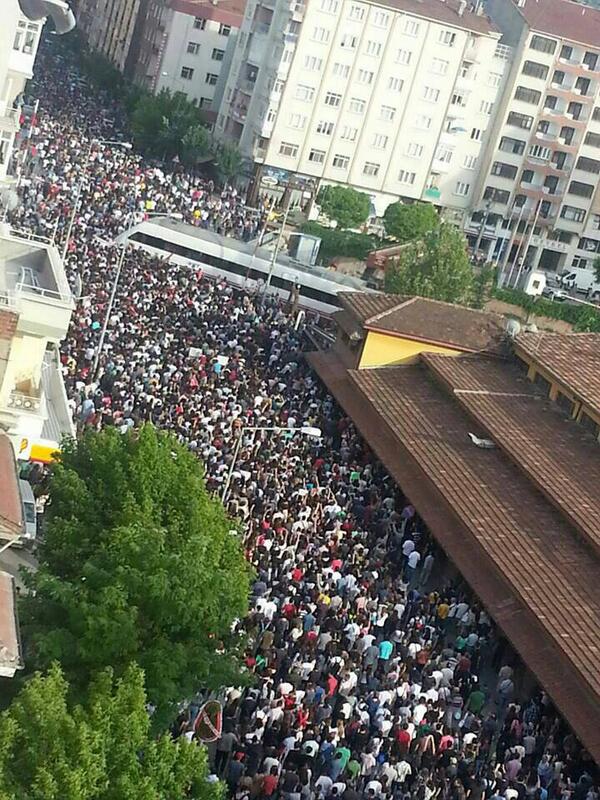Turkey is facing the fiercest anti-government movement of its history. It is described as a historical union of people, as it unites secular nationalists, Kemalists, revolutionary socialists, Kurds, labour unions, students, rival football team supporters, housewives, young and old people. A week has passed since the protests begun. Today, one of Turkey’s big trade unions declared a two-day strike, to demonstrate their support of the grassroots movement in Turkey and to protest against the violent police intervention against unarmed citizens.
The Gezi Park protests in Taksim spreading nationwide
Gezi Park, known as the last green spot of Istanbul, was occupied by hundreds of people opposing the urban redevelopment plan including the demolishing of the park and construction of a shopping mall instead. Occupy-style protests began on 27 May. Protestors were playing guitars, reading books, and basically “hanging out” in the park. The reaction of the police was excessive, early in the morning when people were sleeping, setting their tents on fire, showering people with pepper spray and teargas.
Soon after, the park was occupied again. This time more crowded with the backing of some celebrities, authors, and musicians. As the police dispersed the people with heavy-handed methods, protests just escalated. This time, thousands of people with diverse backgrounds gathered in the famous square of Taksim. Simultaneous gatherings occurred nationwide, mainly in the capital Ankara, Izmir, Eskisehir, and Antalya.

Supporters of the Nationalist Movement Party and Socialist Party next to each other. These two groups of people have known to be rivals (photo: Yunus Emre Sel, DHA)
Viva Social Media
Many complained about the media ignoring the growing protests. CNN Turk was especially criticized as the channel was broadcasting a documentary on penguins the night that the streets of many cities were turned into a battlefield between protestors and the police.
Political pressure on the media has been heavy the last couple of years in Turkey. The country is known to be one of the largest prisons for media.
So it was no surprise that social media became the source of information and knowledge. People have been tweeting from the streets, publishing photos, exchanging volunteer doctor and lawyer contacts for the protestors, and poking the official Twitter accounts of the mainstream TV channels for their ignorance.

Buses from Turkish news channel NTV have been the target of protestors for neglecting to cover the demonstrations. (Photo from Diren Gezi Park (Occupy Gezi Park) Facebook page.)
Concerning the issues, Turkey’s prime minister Recep Tayyip Erdogan blamed the oppositional party for provoking the masses, and lashed out at the role of social media in helping organize and co-ordinate rallies. “And now we have this menace called Twitter,” said Erdogan in an interview with Haberturk Sunday evening. In the aftermath of Erdogan’s speech, 25 people were detained in Izmir because of their tweets, on the grounds of spreading “misleading and libelous information”, Anatolia news agency reported.
Although the prime minister, who is on a political trip to Morocco, has not taken a step beck, deputy prime minister Bulent Arinc apologized on Tuesday “for the police aggression against our citizens who were involved in the initial protests and acted with environmental concern,” as Anadolu news agency reported. He said security forces had been ordered to only use gas in self-defense. Yet, the masses have not calmed down. It is obvious that the demands are no longer merely about the Gezi Park or the urban redevelopment plan of Istanbul. Protestors keep saying it louder that it is more about democracy and the freedom of speech, freedom of lifestyle.
Here is an interview with a protestor, the well known actor Mehmet Ali Alabora on CNN International.
Invasion of the Private Sphere, Bodies, Thoughts, Tweets
Erdogan’s Justice and Development Party (AKP) is popular with conservative Islamic politicians and voters in Turkey. It has won three successive parliamentary elections, gaining almost 50% of the vote in 2011. Political stability has been accompanied by economic growth. According to governmental statistics, “Turkey is expected to be the fastest growing economy of the OECD members during 2012–2017, with an annual average growth rate of 5.2 percent.” In other words, Turkey does not have a serious financial baggage like its European neighbors. Of course, one should check how this growth affects the everyday life of citizens. Researchers draw attention to regional and gender disparities concerning the distribution of the wealth.
Yet, do the confidence of the parliamentary majority of the ruling AKP and the economic growth mean that the government can play the three monkeys (not hearing, speaking, seeing) when faced with society’s demands? Last year, Erdogan provoked outrage when he likened abortion to murder. Only a month ago, a Turkish court convicted pianist and composer Fazil Say of blasphemy and inciting hatred over a series of comments he made on Twitter last year. More recently, Turkey’s parliament passed legislation curbing alcohol sales and advertising.
What we see today on the streets of Turkey is a group that is heavily concerned about their personal space where they think and act freely. They are angry at the way that the authorities try to label them as marginal or a member of an organized unit. I guess one of the best insider comments is from a bisexual blogger:
We ran and stood, aided or got aid, side by side with people who would get disgusted by my sexual preferences, who would condemn me for my religious view or criticize me for my political opinions, because we have one common quality, we are still HUMAN.
Despite the softening reaction of government members (except the prime minister himself, who seems to be the direct target of the protests), resistance is still on. People are waiting for an official guarantee of the abolishment of the redevelopment plan of Gezi Park, legal action on the excessive and abusive police intervention and further actions to ensure the freedom of speech.
It is important to remember that it all started with protecting the trees. It was a bunch of young people occupying their last green spot in the city of Istanbul. It is too early to compare the happenings to the Arab Spring. It is more like an awakening and sweeping away of the fear to raise a voice against the unjust. What Turkey is witnessing today is, apart from certain groups that have a clear political agenda, a unity of people who are basically offended by not being heard, getting beaten by the police force, and being psychologically suppressed. What is happening in Turkey indicates people’s concern about freedom. It should not be merely captured within the polarization of the secularists and the Islamism. As the well-known journalist and lawyer Özgür Mumcu wrote in his column on Radikal on June 3, there is no need to seek conspiracy theories behind the most spontaneous uprising of Turkey. The reason is the arrogant stance of the people in power who do not want to listen to the demands of the citizens. People are fed up being suppressed each time they want to publically criticize the government or display discontent of certain policies. It’s as simple as this.
Remembering the famous line from the poet Nazim Hikmet:
To live! Like a tree alone and free
Like a forest in brotherhood



